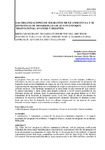
Please use this identifier to cite or link to this item:
http://ricaxcan.uaz.edu.mx/jspui/handle/20.500.11845/168Full metadata record
| DC Field | Value | Language |
|---|---|---|
| dc.contributor | 15139 | - |
| dc.contributor.other | https://orcid.org/0000-0002-0685-3165 | - |
| dc.coverage.spatial | Estados Unidos | es_ES |
| dc.creator | García Zamora, Rodolfo | - |
| dc.creator | Padilla, Juan Manuel | - |
| dc.date.accessioned | 2017-04-25T19:33:50Z | - |
| dc.date.available | 2017-04-25T19:33:50Z | - |
| dc.date.issued | 2012-04 | - |
| dc.identifier | info:eu-repo/semantics/publishedVersion | - |
| dc.identifier.issn | 1575-0825 | es_ES |
| dc.identifier.issn | 2172-3184 | es_ES |
| dc.identifier.uri | http://hdl.handle.net/20.500.11845/168 | - |
| dc.identifier.uri | https://doi.org/10.48779/qmzc-vd79 | - |
| dc.description | The "Three for One" program of collective remittances in Mexico, with its variations, conflicts and difficulties, has been a major breakthrough as a trans-national, organizational effort for the promotion of social development in communities of origin. The key to its success lies in the solidarity of migrant organizations toward their home communities in association with the three levels of the Mexican Government. This transnational philanthropy began spontaneously in the 1960s and thirty years later it began to receive the gradual support of the different levels of the government, until its institutionalization as a federal program in 2002, reporting to the Ministry of Social Development. In 2010, after more than three decades of experience with solidarity projects, the migrant Mexican organizations are considering moving towards a new phase of local development -with a transnational approach- in their regions of origin, seeking greater impact on the economic and social structure. | es_ES |
| dc.description.abstract | El programa "Tres por Uno" de remesas colectivas en México, con sus variantes, conflictos y dificultades, ha sido un gran avance como esfuerzo organizativo transnacional de promoción del desarollo social en las comunidades de origen. La clave de su éxito radica en la solidaridad de las organizaciones de migrantes hacia sus comunidades de origen en asociación con los tres niveles del gobierno mexicano. Esta filantropía transnacional se inicia desde el año sesenta del siglo anterior de manera espontánea y hasta treinta años después comienza a recibir apoyos paulatinos de los diferentes niveles del gobierno hasta su institucionalización como programa federal en el 2002 dependiendo de la Secretaría de Desarrollo Social. En el 2010, luego de más de tres décadas de experiencia de proyectos solidarios las organizaciones migrantes mexicanas se plantean avanzar hacia una nueva fase de desarrollo local con enfoque trasnacional en sus regiones de origen buscando un mayor impacto en la estructura económica y social. | es_ES |
| dc.language.iso | spa | es_ES |
| dc.publisher | Asociación Castellano-Manchega de Sociología, (ACMS) | es_ES |
| dc.relation | http://revistabarataria.es/web/index.php/rb/issue/view/12/showToc | es_ES |
| dc.relation.uri | generalPublic | es_ES |
| dc.rights | Attribution-NonCommercial-ShareAlike 3.0 United States | * |
| dc.rights.uri | http://creativecommons.org/licenses/by-nc-sa/3.0/us/ | * |
| dc.source | Barataria, Nº 13, pp. 47-66, 2012 | es_ES |
| dc.subject.classification | CIENCIAS SOCIALES [5] | es_ES |
| dc.subject.other | info:eu-repo/classification/Clubes Migrantes | - |
| dc.subject.other | info:eu-repo/classification/Migración | - |
| dc.subject.other | info:eu-repo/classification/Proyectos Comunitarios | - |
| dc.subject.other | info:eu-repo/classification/Proyectos de inversión | - |
| dc.subject.other | info:eu-repo/classification/Trasnacionalismo | - |
| dc.title | Las organizaciones de migrantes mexicanos en Estados Unidos y su estrategia de desarrollo local con enfoque transnacional | es_ES |
| dc.type | info:eu-repo/semantics/article | es_ES |
| Appears in Collections: | *Documentos Académicos*-- UA Estudios del Desarrollo | |
Files in This Item:
| File | Description | Size | Format | |
|---|---|---|---|---|
| Garcia, Rodolfo. Las organizaciones migrantes.pdf | Versión publicada | 452,87 kB | Adobe PDF |  View/Open |
This item is licensed under a Creative Commons License
